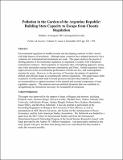Pollution in the Garden of the Argentine Republic: Building State Capacity to Escape from Chaotic Regulation
Author(s)
Amengual, Matthew
DownloadAmengual_Pollution in.pdf (752.4Kb)
OPEN_ACCESS_POLICY
Open Access Policy
Creative Commons Attribution-Noncommercial-Share Alike
Terms of use
Metadata
Show full item recordAbstract
Environmental regulation in middle-income and developing countries is often viewed with high degrees of pessimism. Although many countries have adopted protective laws, violations are widespread and institutions are weak. This paper analyzes the puzzle of shifting patterns of environmental regulation in Argentina, a country with widespread institutional weakness. Most regulators in Argentina take a firefighting approach, acting only when skirmishes emerge between communities and firms. Amidst regulatory chaos, improvements in the environmental performance of firms are few, and noncompliance remains the norm. However, in the province of Tucumán, the pattern of regulation shifted, and officials began to systematically enforce regulations. This paper traces shifts in patterns of enforcement back to broad pressures that provoked industry and environmentalists to support increases in the internal and external components of state regulatory capacity. The analysis uncovers political dynamics that can contribute to strengthening the institutions necessary for sustainable development.
Date issued
2013-11Department
Sloan School of ManagementJournal
Politics & Society
Publisher
Sage Publications
Citation
Amengual, M. “Pollution in the Garden of the Argentine Republic: Building State Capacity to Escape from Chaotic Regulation.” Politics & Society 41, no. 4 (December 1, 2013): 527–560.
Version: Author's final manuscript
ISSN
0032-3292
1552-7514